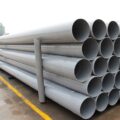average investment > Unlocking the Advantages of Utilizing Nickel-Based Alloys in Manufacturing
Unlocking the Advantages of Utilizing Nickel-Based Alloys in Manufacturing
Throughout history, various metals have played pivotal roles across industries, offering unique applications based on their distinct properties. The ingenious combination of these metals into alloys has further expanded their utility, providing specific advantages tailored to diverse industrial needs. Among these alloys, nickel-based compositions have emerged as a popular choice, offering an array of benefits that significantly impact commercial and industrial applications. Let’s delve into the advantages that make nickel-based alloys a preferred material in manufacturing.
1. Exceptional Corrosion Resistance
In industries grappling with corrosive materials, the choice of metal becomes critical. Nickel alloys stand out due to their superior corrosion resistance, outperforming metals like aluminum and steel. Industries dealing with salt, alkali, acids, and other corrosive substances find nickel alloys to be the ideal solution. The resilience of these alloys against corrosive environments ensures longevity and reliability in challenging applications.
2. High-Temperature Resistance
Nickel alloys exhibit remarkable stability in high-temperature environments, maintaining their mechanical properties even beyond 1000 degrees Celsius. They showcase excellent creep resistance, countering deformation under prolonged exposure to elevated temperatures. Additionally, their low expansion rate, contingent on the alloy’s composition, makes them suitable for applications requiring thermal stability, such as medical implants and optical systems.
These high-temperature properties also position nickel alloys favorably in critical industrial settings like turbochargers, furnace linings, and petrochemical processing facilities, where metals must endure extreme heat.
3. Versatility in Composition
Nickel’s compatibility with various metals allows for the creation of alloys with diverse compositions and properties. The versatility of nickel alloys is exemplified by combinations with elements like molybdenum, chromium, and tungsten. Hastelloy-C22, an alloy comprising these elements, serves as a prime example.
The distinct combination of metals in nickel alloys results in unique characteristics, offering advantages surpassing those of individual elements, other metals, or different alloys. This adaptability makes nickel alloys an invaluable choice for diverse environments and applications.
4. Resistance to Oxidation and Scaling
Oxidation and scaling pose challenges to metals exposed to oxygen, particularly in the presence of moisture or elevated temperatures. These processes lead to the formation of oxidized layers that can compromise the integrity of the material. Nickel alloys exhibit remarkable resistance to oxidation and scaling, ensuring durability and preventing contamination in sensitive manufacturing environments.
5. Ease of Welding and Fabrication
In skilled hands, nickel alloys prove to be relatively easy to weld and fabricate. This characteristic is particularly advantageous in manufacturing processes where intricate structures and shapes are created through welding and fabrication techniques. The ease of working with nickel alloys contributes to the efficiency and precision of manufacturing operations.
In conclusion, while a myriad of metals and alloys exists, nickel-based alloys emerge as a standout choice, offering a unique combination of corrosion resistance, high-temperature stability, compositional versatility, resistance to oxidation, and ease of fabrication. These attributes position nickel alloys as a preferred material in industries requiring resilience and consistency in challenging conditions.




